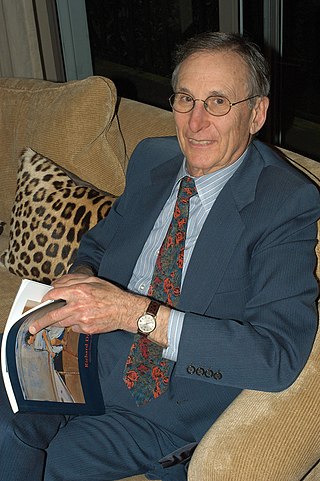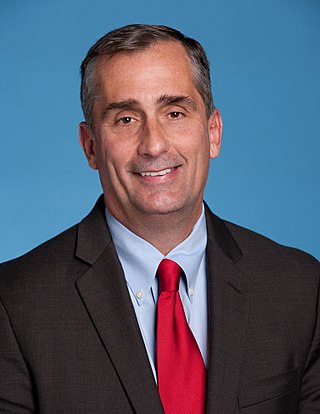
Intel Corporation is an American multinational corporation and technology company headquartered in Santa Clara, California. It is one of the world's largest semiconductor chip manufacturer by revenue, and is one of the developers of the x86 series of instruction sets found in most personal computers (PCs). Incorporated in Delaware, Intel ranked No. 45 in the 2020 Fortune 500 list of the largest United States corporations by total revenue for nearly a decade, from 2007 to 2016 fiscal years.

Robert Norton Noyce, nicknamed "the Mayor of Silicon Valley", was an American physicist and entrepreneur who co-founded Fairchild Semiconductor in 1957 and Intel Corporation in 1968. He was also credited with the realization of the first monolithic integrated circuit or microchip, which fueled the personal computer revolution and gave Silicon Valley its name.

Craig R. Barrett is an American business executive who served as the chairman of the board of Intel Corporation until May 2009. He became CEO of Intel in 1998, a position he held for seven years. After retiring from Intel, Barrett joined the faculty at Thunderbird School of Global Management in Phoenix.
National Semiconductor was an American semiconductor manufacturer which specialized in analog devices and subsystems, formerly with headquarters in Santa Clara, California. The company produced power management integrated circuits, display drivers, audio and operational amplifiers, communication interface products and data conversion solutions. National's key markets included wireless handsets, displays and a variety of broad electronics markets, including medical, automotive, industrial and test and measurement applications.

Andrew Stephen Grove was a Hungarian-American businessman and engineer who served as the third CEO of Intel Corporation. He escaped from the Hungarian People's Republic during the 1956 revolution at the age of 20 and moved to the United States, where he finished his education. He was the third employee and eventual third CEO of Intel, transforming the company into the world's largest semiconductor company.

Fairchild Semiconductor International, Inc. was an American semiconductor company based in San Jose, California. Founded in 1957 as a division of Fairchild Camera and Instrument, it became a pioneer in the manufacturing of transistors and of integrated circuits. Schlumberger bought the firm in 1979 and sold it to National Semiconductor in 1987; Fairchild was spun off as an independent company again in 1997. In September 2016, Fairchild was acquired by ON Semiconductor.

Gordon Earle Moore was an American businessman, engineer, and the co-founder and emeritus chairman of Intel Corporation. He proposed Moore's law which makes the observation that the number of transistors in an integrated circuit (IC) doubles about every two years.

Taiwan Semiconductor Manufacturing Company Limited is a Taiwanese multinational semiconductor contract manufacturing and design company. It is the world's most valuable semiconductor company, the world's largest dedicated independent ("pure-play") semiconductor foundry, and its country's largest company, with headquarters and main operations located in the Hsinchu Science Park in Hsinchu, Taiwan. It is majority owned by foreign investors, and the central government of Taiwan is the largest shareholder.

Infineon Technologies AG is Germany's largest semiconductor manufacturer.

Arthur Rock is an American businessman and investor. Based in Silicon Valley, California, he was an early investor in major firms including Intel, Apple, Scientific Data Systems and Teledyne.
Robert B. Palmer is an American businessman in the computer industry.

Patrick Paul Gelsinger is an American business executive and engineer currently serving as CEO of Intel.

Barbara McConnell Barrett is an American businesswoman, attorney and diplomat who served as the United States secretary of the Air Force from 2019 to 2021. She is also an instrument-rated pilot, and cattle and bison rancher.

Leslie L. Vadász is a Hungarian-American engineer and manager, one of the founding members of Intel Corporation.
Microsemi Corporation was an Aliso Viejo, California-based provider of semiconductor and system solutions for aerospace & defense, communications, data center and industrial markets.

Brian Matthew Krzanich is an American engineer. Krzanich joined Intel as an engineer in 1982 and served as chief operating officer (COO) before being promoted to CEO in May 2013. As CEO, Krzanich was credited for diversifying Intel's product offerings and workforce. However, during Krzanich's term as CEO, Intel went through major restructurings and pulled out of the mobile chip market. Because of Krzanich's decisions, Intel also struggled to produce 10-nanometer chips, compared to chip manufacturers TSMC and Samsung, resulting in numerous delays and a loss of market share in the computer chip business to rivals like AMD.

Scott A. McGregor is an American technology executive and philanthropist. He was the lead developer of Windows 1.0, he was the CEO of Philips Semiconductors from 2001 to 2004, and was the CEO of Broadcom from 2005 until its acquisition in 2016.

The CHIPS and Science Act is a U.S. federal statute enacted by the 117th United States Congress and signed into law by President Joe Biden on August 9, 2022. The act provides roughly $280 billion in new funding to boost domestic research and manufacturing of semiconductors in the United States. The act includes $39 billion in subsidies for chip manufacturing on US soil along with 25% investment tax credits for costs of manufacturing equipment, and $13 billion for semiconductor research and workforce training, with the primary aim of countering China.













